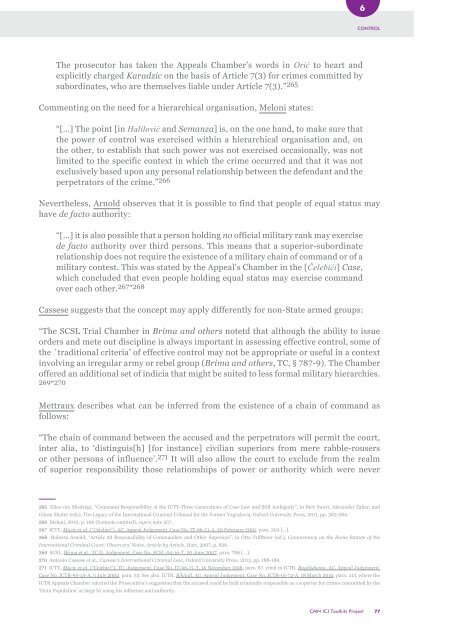Command Responsibility
CMN_ICL_Guidelines_Command_Responsibility_En
CMN_ICL_Guidelines_Command_Responsibility_En
You also want an ePaper? Increase the reach of your titles
YUMPU automatically turns print PDFs into web optimized ePapers that Google loves.
6<br />
CONTROL<br />
The prosecutor has taken the Appeals Chamber’s words in Orić to heart and<br />
explicitly charged Karadzic on the basis of Article 7(3) for crimes committed by<br />
subordinates, who are themselves liable under Article 7(3).” 265<br />
Commenting on the need for a hierarchical organisation, Meloni states:<br />
“[…] The point [in Halilović and Semanza] is, on the one hand, to make sure that<br />
the power of control was exercised within a hierarchical organisation and, on<br />
the other, to establish that such power was not exercised occasionally, was not<br />
limited to the specific context in which the crime occurred and that it was not<br />
exclusively based upon any personal relationship between the defendant and the<br />
perpetrators of the crime.” 266<br />
Nevertheless, Arnold observes that it is possible to find that people of equal status may<br />
have de facto authority:<br />
“[…] it is also possible that a person holding no official military rank may exercise<br />
de facto authority over third persons. This means that a superior-subordinate<br />
relationship does not require the existence of a military chain of command or of a<br />
military contest. This was stated by the Appeal’s Chamber in the [Čelebići] Case,<br />
which concluded that even people holding equal status may exercise command<br />
over each other. 267 ” 268<br />
Cassese suggests that the concept may apply differently for non-State armed groups:<br />
“The SCSL Trial Chamber in Brima and others notetd that although the ability to issue<br />
orders and mete out discipline is always important in assessing effective control, some of<br />
the `traditional criteria’ of effective control may not be appropriate or useful in a context<br />
involving an irregular army or rebel group (Brima and others, TC, § 787-9). The Chamber<br />
offered an additional set of indicia that might be suited to less formal military hierarchies.<br />
269 ” 270<br />
Mettraux describes what can be inferred from the existence of a chain of command as<br />
follows:<br />
“The chain of command between the accused and the perpetrators will permit the court,<br />
inter alia, to ‘distinguis[h] [for instance] civilian superiors from mere rabble-rousers<br />
or other persons of influence’. 271 It will also allow the court to exclude from the realm<br />
of superior responsibility those relationships of power or authority which were never<br />
265 Elies van Sliedregt, “<strong>Command</strong> <strong>Responsibility</strong> at the ICTY-Three Generations of Case Law and Still Ambiguity”, in Bert Swart, Alexander Zahar, and<br />
Göran Sluiter (eds), The Legacy of the International Criminal Tribunal for the Former Yugoslavia, Oxford University Press, 2011, pp. 383-384.<br />
266 Meloni, 2010, p. 106 (footnote omitted), supra note 257.<br />
267 ICTY, Mucic et al. (“Celebici”), AC, Appeal Judgement, Case No. IT-96-21-A, 20 February 2001, para. 303 […].<br />
268 Roberta Arnold, “Article 28 <strong>Responsibility</strong> of <strong>Command</strong>ers and Other Superiors”, in Otto Triffterer (ed.), Commentary on the Rome Statute of the<br />
International Criminal Court: Observers’ Notes, Article by Article, Hart, 2007, p. 826.<br />
269 SCSL, Brima et al., TC II, Judgement, Case No. SCSL-04-16-T, 20 June 2007, para. 788 […].<br />
270 Antonio Cassese et al., Cassese’s International Criminal Law, Oxford University Press, 2013, pp. 188-189.<br />
271 ICTY, Mucic et al. (“Celebici”), TC, Judgement, Case No. IT-96-21-T, 16 November 1998, para. 87, cited in ICTR, Bagilishema, AC, Appeal Judgement,<br />
Case No. ICTR-95-1A-A, 3 July 2002, para. 53. See also, ICTR, Bikindi, AC, Appeal Judgement, Case No. ICTR-01-72-A, 18 March 2010, para. 413, where the<br />
ICTR Appeals Chamber rejected the Prosecution’s suggestion that the accused could be held criminally responsible as a superior for crimes committed by the<br />
‘Hutu Population’ at large by using his influence and authority.<br />
CMN ICJ Toolkits Project<br />
77


